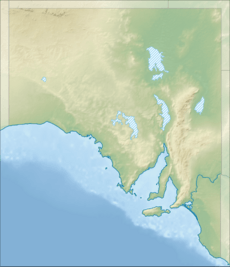Hale Conservation Park facts for kids
Quick facts for kids Hale Conservation ParkSouth Australia |
|
|---|---|
|
IUCN Category III (Natural Monument)
|
|
| Nearest town or city | Williamstown |
| Established | 9 January 1964 |
| Area | 1.89 km2 (0.7 sq mi) |
| Managing authorities | Department for Environment and Water |
| Website | Hale Conservation Park |
| See also | Protected areas of South Australia |
Hale Conservation Park is a special protected area in South Australia. It's located near Williamstown, about 60 kilometers (37 miles) north-east of Adelaide. This park helps protect nature and wildlife.
It's a great place to explore the rugged hills of the Mount Lofty Ranges. The park is managed by the Department for Environment and Water.
Contents
Park History and Name Changes
Hale Conservation Park has had a few different names over the years. It first became a protected area on January 9, 1964. At that time, it was called a wildlife reserve. This meant the land was set aside to protect animals and plants.
Later, on February 4, 1965, it was officially named the Hale Wild-Life Reserve. Then, on November 9, 1967, it became the Hale National Park. Finally, on April 27, 1972, it was renamed Hale Conservation Park. This is the name it still holds today. As of 2018, the park covers an area of 1.89 square kilometers (0.73 square miles).
What Makes Hale Park Special?
Hale Conservation Park is located in a very hilly area. It's part of the northern Mount Lofty Ranges. This makes it a unique place for different kinds of plants and animals.
Plants and Trees
The park is home to a type of forest called a low open forest. Here you can find several types of eucalyptus trees. These include the Eucalyptus obliqua, Eucalyptus goniocalyx, and Eucalyptus fasciculosa. Below these tall trees, there's a thick layer of smaller plants called a heath understorey.
Animals You Might See
Many animals live in Hale Conservation Park. You might spot a western grey kangaroo hopping through the trees. Another interesting animal found here is the echidna. Echidnas are spiny mammals that look a bit like a porcupine.
Over 60 different types of birds have been seen in the park. One special bird is the scaly thrush. This bird is considered threatened in South Australia. This means it's at risk because its natural home is being destroyed. Finding them in Hale Conservation Park is important for their survival.
Unique Geology
Hale Conservation Park also has interesting rocks and landforms. It contains unique geological features. These show where different layers of rock meet. This is a special discovery for scientists who study the Earth's history.
Protecting Hale Conservation Park
Hale Conservation Park is classified as an IUCN Category III protected area. This means it's a natural monument or feature. These areas are protected mainly for their specific natural features. They are also important for their cultural or spiritual value.
In 1980, the park was listed on the former Register of the National Estate. This register was a list of places in Australia that were important for their natural or cultural heritage.
 | Toni Morrison |
 | Barack Obama |
 | Martin Luther King Jr. |
 | Ralph Bunche |


